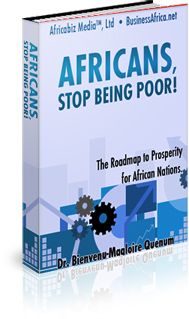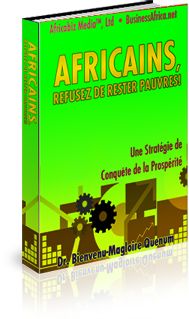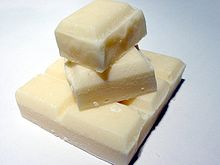|
****JavaScript based drop down DHTML menu generated by NavStudio. (OpenCube Inc. - http://www.opencube.com)****



Click
here for
Million ads and auctions
|
| ! |
| AFRICABIZ
VOL 2 - ISSUE: 123
July
15 - October 14, 2011
Previous
Issue
Editor: Dr. Bienvenu-Magloire Quenum
Click here for contact & support console
| | A
WORD FROM THE EDITOR
| | |
|
Dear visitor and international investor,
We
warmly welcome you, if this is
your first visit to Africabiz
Online - The ultimate newsletter
on trading and investing in 49
sub-Saharan African countries.
If you are a regular and faithful
reader, welcome back.
-
TO IMPOSE DEMOCRACY AT GUN POINT? OR HIDDEN AGENDA?
On March 17, 2011 UN's
Security Council voted for a no-flight zone resolution, “to
take all necessary measures to protect civilians and civilian populated
areas (on Libya territory) under threat of attack... while excluding an
occupation force.”
Resolution to
be enforced to protect civilians against Colonel Gaddafi's regime repressive
actions against rebels, mainly from the Cyrenaica/Benghazi
region - whose people are demanding
the instauration of democracy in Libya.
As always, the ambiguous verbiage of the resolution - that is mainly the astutely
worded "all
necessary measures" proviso, opened door to all kinds of interpretation
by the sponsors of the resolution, France, United Kingdom and the United
States of America. Not to forget the cleverly worded, "while excluding
an occupation force"
that assisted lowering the guard of non-permanent UN Council's state members,
such as Gabon and South Africa, to voting the resolution.
Indeed, as soon as UN Resolution 1973 voted, the military arm
of the countries that sponsored the resolution, the North Atlantic Treaty
Organization - NATO, scrambled war planes and started a bombing campaign to neutralize
Libya's airspace, destroying Libya air-forces bases, army barracks,
army's supporting logistics, universities's compounds at Tripoli the Libya's
capital city, banks buildings, and also targeting Commander in Chief (Colonel
Gaddafi) residential area - or any place, private or public, in which his presence
might be detected by intelligence screening devices.
Obviously, the UN's No Flight Resolution had been cleverly written and coined
to be interpreted by Nato's nations, France, United Kingdom and the United States
of America in particular, as a regime change mandate to physically get rid of
Colonel Gaddafi, to topple his regime - established in 1969, after a coup
against the ruling king.
So, since 4 months - starting from March 21, 2011 Libya's territory is submitted
to daily heavy bombardments, to assist the rebels establish democracy.
A sober observer is rightly entitled to question the move taken by NATO to
destroy infrastructure, roads, ports, government buildings, banks offices and
universities's compounds - built over decades, in the pretence to establishing
democracy. Is that really the main reason? Establishing democracy?
What is really the number
of rebels compared to the entire Libya's population? Do they represent the majority
of people of Libya? Do they outnumber the supporters of the regime in
the Tripolitania and Fezzan regions?
Or is this pretence to protect rebels
against Gaddafi repressive forces and impose democracy at gun point just a curtain
for a hidden agenda?
One is entitled to raise above short listed questions. Indeed, common sense
knows that Democracy is not a commodity that one could export and sell to other
people around the world. Each country in the world at large has its history and
traditional practices that forcibly taint the practice of Democracy.
Can one
compare Democracy practice in the flourishing city-state of Singapore to the
practice of Democracy in any other western developed country? Are Taiwan, South
Korea and the tiger nations of Asia undemocratic nations? [1]
This space is too small to discourse about democracy, but one can briefly ask
about what Democracy is really about? Consulting an English
dictionary one reads the following:
Democracy, the political orientation of those who favor government by the people
or by their elected representatives. Or, a political system in which the supreme
power lies in a body of citizens who can elect people to represent them.
And again: the doctrine that the numerical majority of an organized group can
make decisions binding on the whole group.
Above definitions are simplification of a matter which is hot debate since
the world exists. And in modern time, the concept of representative democracy
arose largely from ideas and institutions that developed during the European
Middle Age, the Age of Enlightenment/Renaissance, and in the American and French
Revolutions.
Nowadays, the
right to vote is strongly related to Democracy as promoted by western
nations. Any regime in the world, that does not follow the pattern of staging
transparent elections on regular schedule, to elect the rulers and representatives
of the country; or a regime which rulers stay "too long" in power,
is considered - in
the view of western nations' elites and rulers, a non-democratic regime, and
branded a dictatorship, no matter the economic realizations achieved by said
"undemocratic" regime to creating and distributing riches for all in said country.
As stated
10 years ago, about the invasion of Iraq by
the United States of America, Africabiz Online believes that it is more constructive
to build on existing assets instead of bombing and destroying everything to start
again from scratch.
France, UK and the United States of America actions to bombing
Libya to democracy, trying to topple the regime of Colonel Gaddafi, is simply
the destruction of a nation in the making.
The alternative would have been to
promote dialogue between the rebels and the ruling regime, (as advised by the
African Union) and take coercive
actions, diplomatic and financial, excluding bombing of infrastructure, to engage
rival parties to discuss and find solutions that preserve economic assets.
Unless,
the establishment of democracy at gun point in emerging countries, is just a
false argument to put in place puppet regimes economically dependent upon and
politically obedient to the international powers of the day.
Click
here to read about Tribute to Gaddafi Panafricanism In Spite of
Everything Else.
- SERVICES AND PRODUCTS FROM Dr. QUENUM & ASSOCIATES / BUSINESSAFRICA (TM)
List of Products and Solutions to trading and investing in and out emerging nations - and particularly in sub-Saharan African nations - is here to review.
We draw your attention to the Jobs & Projects' platform that assists first, project-owners to tender for the best experts to carry out projects at very competitive costs, and, second, job-seekers to publish for free Résumés/CV to attract project-owners attention.
The Free and Pay-Per-Click advertisement platform is also the cheapest way to advertise for your business and drive traffic to your website.
- Contributor's Guidelines are here to review. Your contribution on "How emerging nations and particularly African countries / entrepreneurs could bridge the developing gap" is
welcome.
| Your feedback / objection / contribution is welcome. Visit WorldWide BizCenter, and choose General Information (as topic) to create a thread for discussion. On the top of the WorldWide BizCenter page, there is a HELP link to assist you making an efficient use of the discussion board. This link also is useful | Many
thanks for dropping by and see you here on October 15, 2011
Dr. B.M. Quenum
Editor of AFRICABIZ

|
| |
| BUSINESS
OPPORTUNITIES IN AFRICA
|
 -Several business opportunities with high profit making potential, which are economic catalysts and components to the Strategy for African Countries are listed in following table. -Several business opportunities with high profit making potential, which are economic catalysts and components to the Strategy for African Countries are listed in following table.
|
1-SHEA BUTTER (5,
6, 7,
11, 12,
13)
2- BLUE GOLD (14,
15, 16,
17, 18,
19)
3- FREEZE-DRIED PAPAIN (20,
21, 22
and here)
4- KENAF (23,
24)
5- VEGETABLE OIL (25,
26, 27,
28)
6- CEREALS (30,
31, 32,
33)
7- FRUITS (34,
35, 36,
37, 38,
39, 40,
42, 43,
44, 45,
46)
8- ESSENTIAL OILS (47,
48, 49,
50, 51,
52)
9- ROOTS & TUBERS (54, 55, 56, 57, 58, 59, 60, 61, 62, 63, 64) |
10- FOWL BREEDING (66, 67, 68, 69, 70, 71, 72, 73, 74, 75, 76)
11- FISH FARMING (78, 79, 80, 81, 82, 83, 84, 85, 86, 87)
12- BIOMASS ENERGY (89, 90, 91, 92)
13- SUGAR
CANE & PRODUCTS (93, 94, 95, 96, 97, 98,
99/100, 101, 102)
14- LIVESTOCK (103,
104,
105,
106,
107,
108,
109, 110,
111,
112
15- MISCELLANEOUS (113, 114, 115, 116, 117, 118, 119, 120, 121, 122, 123,
124 |
|
 -
MISCELLANEOUS SERIES:ECONOMICS OF A MINI-SCALE FACILITY
TO PRODUCING LIQUID GLUCOSE FROM CASSAVA STARCH -
MISCELLANEOUS SERIES:ECONOMICS OF A MINI-SCALE FACILITY
TO PRODUCING LIQUID GLUCOSE FROM CASSAVA STARCH
A previous delivery started this series about starch industry, and the YouTube video at this link highlights the importance of starch industry.
Sub-Saharan African countries's national
productions, except in Nigeria and South Africa are confidential in the range
of up to 500 metric tons a year, and currently most African countries are
net importer of Starch.
It is good noticing that market opportunity for native cassava starch will exist to some extent in any African country that is becoming more industrialized as Starch is an important raw material for a large string of industries, textiles, paper, adhesives, pharmaceuticals, and food.
 One
of the by-product deriving from cassava/ cassava starch is glucose. In brief, Glucose in free or combined form is not only the most common of the sugars but is probably the most abundant organic compound in nature. Glucose is the primary fuel for the brain and muscles, and because the brain is very sensitive to shortages, there are a number of control mechanisms in the body which tend to keep blood glucose level constant. Excess glucose is either converted by the liver and muscle cells into glycogen, or turned into body fat. One
of the by-product deriving from cassava/ cassava starch is glucose. In brief, Glucose in free or combined form is not only the most common of the sugars but is probably the most abundant organic compound in nature. Glucose is the primary fuel for the brain and muscles, and because the brain is very sensitive to shortages, there are a number of control mechanisms in the body which tend to keep blood glucose level constant. Excess glucose is either converted by the liver and muscle cells into glycogen, or turned into body fat.
The image at the left of this paragraph represents glucose tablets. Industrial
glucose - also called dextrose, was first manufactured in France during World
war II, to replace sucrose that
become a scarcity. Glucose syrup extracted from dried cassava pellets or starch,
is colorless. It is a raw material to producing vitamin C in the Reichstein process,
to make citric acid, gluconic acid, bio-ethanol, polylactic acid, sorbitol.
The string of above listed industrial products deriving from glucose, once again shows why an efficient developing scheme should have a starch industry component, to catering for a wide range of industrial consumers's products.
Following previous deliveries [1, 2, 3, 4] briefly dealt with the production of glucose from other raw materials such as cereals and sugar cane.
This current delivery considers a small-scale glucose production from cassava
starch. It is a continuation of the previous
one here available. Following link exposes production
flow chart of glucose from cassava
 -BASICS ECONOMICS OF A SMALL SCALE PRODUCING UNIT -BASICS ECONOMICS OF A SMALL SCALE PRODUCING UNIT
The
basic economics about a small-scale cassava-starch producing unit available at following link, show that a small-scale cassava starch production unit delivers 444 metric tons of starch (from 1,950 metric tons of fresh cassava).
The small-scale glucose producing unit here exposed would be producing
at capacity 2,500 metric tons of glucose syrup, from 1,870 metric tons of cassava
starch (that is 4.21 times the production of the cassava starch unit described
at above outlined link). The economics of a small-scale producing unit reads
as follows:
|
Amount
US) |
|
INVESTMENT
|
Processing
Equipment: A power generating system. Steam production unit (600
kg per hour). Global production facility, building (400 sqm); 20 tons storage
tanks, 2 truck with 10 tons tanks. Etc. |
850,000 |
|
OPERATING COSTS
|
Operating
Expenses: 1- Raw
material purchasing: 1,870
metric tons of cassava starch (purchased
from producing units here
described), 8 tons of hydrochloric
acid, 2,750 tons of sodium
carbonate.
2- Production
costs - insurance - utilities (water, gas, fuel) - staff
and hands / management salaries - amortization - interests
on loan, and maintenance (lubricants, hand tools, cutting
tools, abrasives, 300 kg packaging drums. Etc. |
1,300,000 |
PRODUCTION
COST PER METRIC TON OF GLUCOSE SYRUP
SCROLL DOWN TO
SEE REMARK BELOW |
| 2,500
metric tons of glucose syrup= |
520 |
| GENERATED
REVENUES |
| Glucose : 2,500 x 600 US$ = |
1,500,000 |
| Wastes
(animal feed) = 750 metric tons x 2 US$ (click
here for more) |
1,500 |
| TOTAL
REVENUES |
1,501,500 |
| GROSS
PROFIT |
| GROSS
PROFIT |
201,500 |
One
can see that the production of Glucose syrup from cassava starch, compares
well against the production
of dried cassava ship from fresh cassava root. The gross profit level
increases twenty times from US$11,212 to US$201,500.
Another proof that further transformation of raw materials increases added
value and profits.
Hence the importance
for emerging countries to initiate
developing policies that transform agricultural
products into more elaborate consumers' produces - and stop selling bulk
agriculture productions on the international market place.
REMARK: Glucose have half of sweetening power of sugar from
sugar cane stick. However, the low producing price off-factory, above outlined
(USD520 per metric ton), compared well with the producing cost of brown sugar
sugar cane (USD598)
as here
exposed.
One can foresee the impact that the setup of several production
units would have on the developing growth of a country, catering for sugar
national demand and providing a valuable raw material to establishing numerous
industrial units, including textiles, paper, adhesives, pharmaceuticals, beverages
and a long string of food stuffs.
| MORE ON THE
STARCH INDUSTRY |
1- A Practical Treatise on the Manufacture of Starch
Glucose, Starch-Sugar, and Dextrine. Illustrated by 58 Engravings (1881)
by Julius Frankel - Paperback (Aug 10, 2009)
2- The
Principal Starches Used as Food
by W. Griffiths - Paperback (Oct 21, 2009)
3- The World Market for Residues
Resulting from the Manufacture of Starch
by Icon Group - Paperback (Sep 30, 2008)
4- Chemistry and Technology of Starch
by James N. BeMiller and Roy L. Whistler - Hardcover (Mar 23, 2009)
5- Starches:
Characterization, Properties, and Applications
by Andrea Bertolini - Hardcover (Dec 7. 2009)
6- Industrial uses of Starch and its Derivatives
by R. W. Radley - Hardcover (Spt. 30, 1976)
|
7- Starch Madness
by Richard L. Heinrich - Paperback (Nov. 1998)
8- Handbook of Starch Hydrolysis Products
And Their Derivatives
by S. Z. Dziedzic and M.W. Kearsley - Hardcover (Dec 31, 1995)
9- Starches handbook
by David J., Thomas and Williams A. Atwell - Paperback (Feb 1, 1998)
10- Starch:
Basic Science to Technology
Advance in Food and Nutrition Research
by Mirta Noemi Sivak, Jack Preiss, and Steve Taylor - Hardcover (Aug 3, 1998)
11- The 2009-2014 World Outlook
For Modified Corn and Sorghum Starch, and Dextrine
by Icon Group - Paperback (Sep 26, 2008)
12- Starch in Food
Structure, Function and Applications
by Ann-Charlotte Eliasson- Hardcover (Sep 20, 2004) |
Adobe
Acrobat Reader is available here
- Interested parties - private African and international investors /
companies, government
agencies,
international development
agencies - to make contact through the Free Access Support Console available at this link
Contact through the support console will get quickest reply from Africabiz Online's staff, than contact by emails. Click here for contact information. Be advised that first contact should be through the support console to be followed by phone calls. If you are a VIP-Member, use VIP-Members Support Console available here.
Before you consult please click
here to review this clarification
|
| |
|

